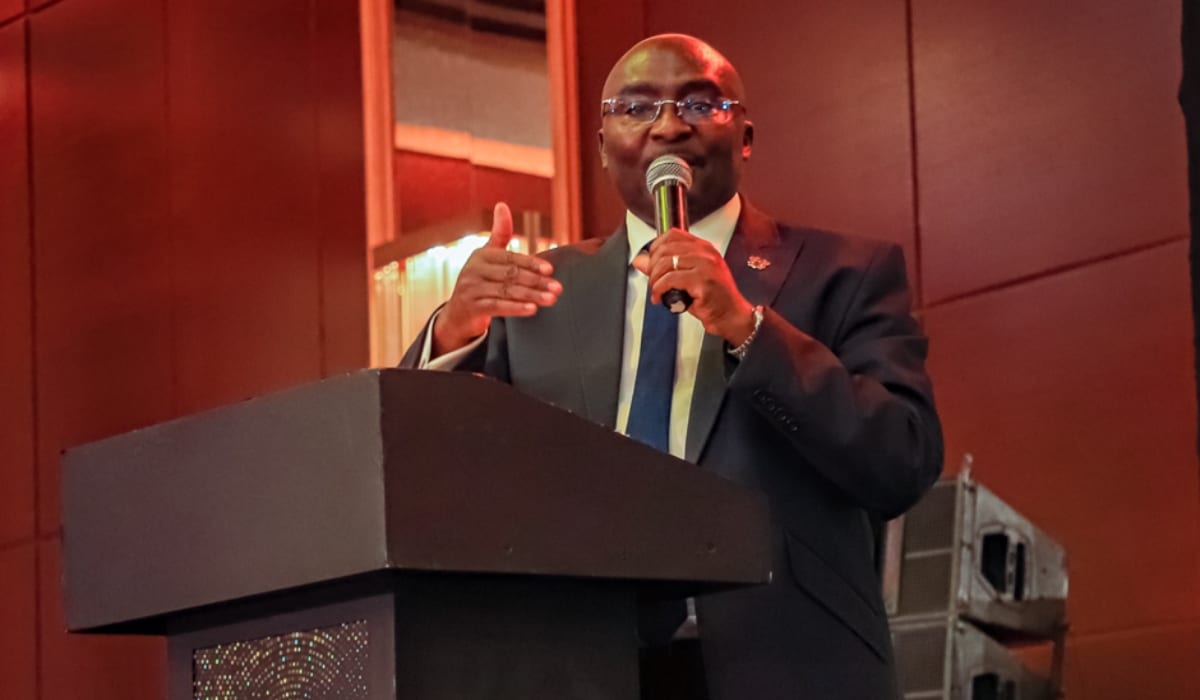The Vice President and Flagbearer of the NPP, Dr. Mahamudu Bawumia, has reiterated his commitment to creating a friendly economic environment for businesses and the private sector to thrive and drive the transformation of the economy under his Presidency.
At a special dinner last night, which brought together CEOs of companies and other key players of the private sector, to interact with Presidential Candidates of the two major parties, Dr. Bawumia told the CEOs the private sector I indispensable to the growth of the economy, insisting that the economy can only thrive and enjoy sustainable growth when the private sector is doing well.
“When businesses do well, the economy does well, and vice versa. Show me a buoyant national economy in any part of the world and I’ll show you strong and resilient businesses behind it,” Dr. Bawumia said, reiterating his strong desire to implement what he called bold solutions to help the sustainable growth of businesses and the private sector.”
“My vision for Ghana is to implement bold innovative solutions to ensure sustainable development.”
At the centre of Bawumia’s bold solutions for businesses, includes his plans to overhaul the present tax system, which he said is inimical to the growth of businesses, allowing the private sector to undertake more of government infrastructure projects, etc.
In all, including the introduction of a new, business-friendly tax regime, Bawumia listed…….. steps to help boost the business private sector, in what he said, will be a revived economy with an expected GDP growth rate of 5.6, following the remarkable indicators of recovery.
“I know many of you in this room are eager to take advantage of the economic recovery to build back up your enterprise,” Dr. Bawumia said.
“Yet, you may also be struggling with a big tax burden and huge penalties slapped on top of your tax arrears. Many of you are spending precious time that can be used productively, going back and forth with revenue officers, over disagreements on what may be owed.”
“I want to relieve you of that headache. If elected, I will do so by introducing a radically new tax system, beginning in 2025,”
Below are Bawumia’s steps to revive the business:
a. Tax Amnesty
“My government will provide a total tax amnesty (i.e. a complete exemption from the payment of prior taxes due and the waiving of all associated interest and penalties) to individuals and businesses who failed to file taxes in previous years,” Dr. Bawumia said.
“The intention, like all amnesties, is not to reward bad behaviour but, rather, to give the beneficiaries a fresh start. In return, my government will expect all those who benefit from this most significant gesture to invest such savings directly into creating jobs and growing their business.
b. Flat Tax Rate
“From all my interactions with taxpayers, what you want is a tax regime that is easy to understand, easy to comply with, easy to enforce, softer on the taxpayer and, certainly, not dependent on the discretion of the tax collector. I pledge to give you exactly what you want,” Dr. Bawumia assured the CEOs.
” My government will introduce a flat tax of a percentage of income for individuals and businesses with appropriate exemption thresholds set to protect the poor. We will simplify the corporate tax system. We will reform the Value Added Tax regime by merging all levies into a single line-item levy and treat the merged levy as part of input and output VAT. The new system should allow you to complete your tax return in minutes.”
c. Electronic filing of taxes for efficiency
“Also, everyone will be required to file a very simple tax return electronically. E-invoicing, as being implemented by the GRA will be extended to all companies. There will be no manual or paper filing of taxes. The sight of GRA officers stationed on factory and shop floors will soon be history, ”
” Faceless assessments will provide transparency and accountability and enhance the fight against corruption and the push for greater compliance,”
d. Empower the private sector to undertake public infrastructure projects.
“A Bawumia Presidency will encourage and empower the private sector to finance, build, and rent or lease-to-own to government a vast number of public infrastructure, from schools to homes, and from roads to equipment and vehicles.”
“Let me emphasise, my government will be for business. All I ask is for business to be with me. A Bawumia Presidency will encourage and empower the private sector to finance, build, and rent or lease-to-own to government a vast number of public infrastructure, from schools to homes, and from roads to equipment and vehicles.”
‘We recognize the primacy of government spending in enhancing growth, and my government will be deliberate in directing this significant government power to the private sector. By leveraging the purchasing power of government and channeling it towards the private sector, Ghanaian businesses will have a stable and increased pipeline of projects and revenues, based on which they will create jobs and services.”
“My government will facilitate structured long-term financing and payments options to support it. This will also lead to efficiency gains by cutting waste, corruption and ensuring value for money in procurement. My focus is to find solutions and not to echo problems, repeatedly
In other to to achieve the above, Dr. Bawumia proposed the following
i. increase Public-Private-Partnerships (PPPs) as an important financing model for delivering public infrastructure projects, including schools, housing, water, and roads
ii Cut 3% of GDP from government expenditure (GH₵30 billion), and redirect it towards private sector provision of public infrastructure and services, as earlier stated
iii. leverage government’s purchasing power to stimulate industrial expansion and business growth with a strict “Buy Ghana First” policy, under which all goods and services procured by the public sector will first be sourced from local producers or service providers
iv. establish an SME Bank to meet the special financing needs of small and medium businesses, which employ over 80% of Ghanaians, especially women
v. set up a Women’s Trade Empowerment Fund to support women-owned businesses with funds for expansion and working capital
vi. offer start-up companies Investment Tax Credits (ITC) for the first three (3) years of their operations
vii. make the cost of electricity cheaper for industries by making commercial tariffs equal or lower than residential rates
viii. introduce a flat rate system of duties for all importers
ix. lower port charges to compete with charges in regional ports, particularly, Lome, Togo.
x. Today, we made history when I launched the first individualized credit scoring regime in Ghana, MyCredit Score. We are going to use the Credit Scoring System to enable the average Ghanaian to buy on credit: “Buy now, pay small, small”. This will increase domestic demand, increase production and create jobs
xi. Establish a Fintech Fund with seed capital of US$100 y attract additional private sector funding to support Ghanaian start-ups developing payments and financial services solutions
xii. Arovide venture funding and grant support for commercially viable tech projects by Ghanaian start-ups to drive innovation, foster high-tech entrepreneurship, create jobs, and grow Ghanaian high-tech businesses, and
xiii. complete the digitalisation of land titling and registration to allow owners of landed properties to use their assets to raise capital for business growth and expansion.
Having listed his vision to help the private sector thrive, Dr. Bawumia assured the CEOs of his commitment towards sustainable development for the private sector.
“My vision for Ghana is to implement bold innovative solutions to ensure sustainable development. Beware of those seeking short-term mandates and promising quick fixes. They don’t last.”
“Sustainable development is not an alternative, it is our only option. In Ghana, 73% of the population is 0 to 35 years old. This means that about seven in ten Ghanaians are children and young people. The present and future generations are counting on us for quality and more affordable education. They are counting on us for improved health services, peace and security, reliable food supply, a safe environment, clean water, and above all sustainable jobs and economic prosperity.”






